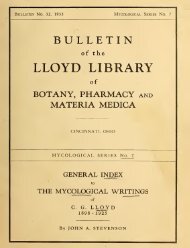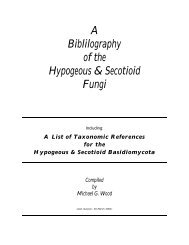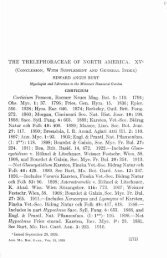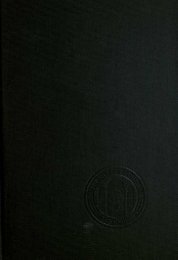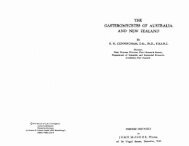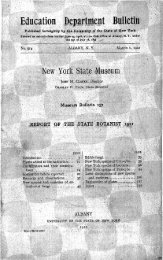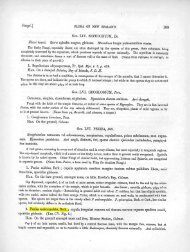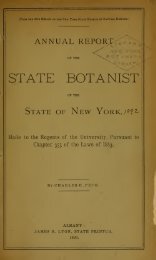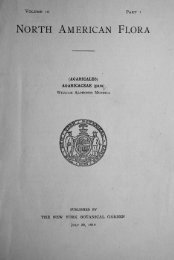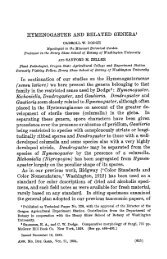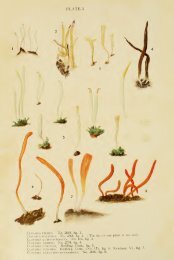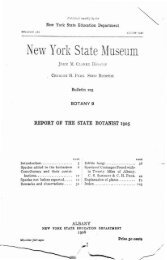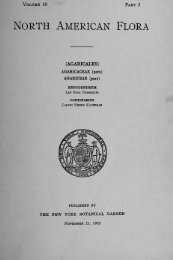- Page 2:
III THE LIBRARY OF THE UNIVERSITY O
- Page 8 and 9:
Index Vol. IV. Mycological Notes, 3
- Page 10 and 11:
Cordyceps Continued cinerea* Note 9
- Page 12 and 13:
INDEX OF SPECIES . Hydnum Continued
- Page 14 and 15:
INDEX OF SPECIES Polypoms Continued
- Page 16 and 17:
INDEX OF SPECIES 10
- Page 18 and 19:
Xerotus Continued fuliginosus later
- Page 20 and 21:
Lowe, Mrs. F. E., Massachusetts, Ly
- Page 22 and 23:
MYCOLOGICAL NOTES And Other Publica
- Page 24 and 25:
PROFESSOR CHARLES H. PECK. At vario
- Page 26 and 27:
List of Monographs Peck, with the n
- Page 28 and 29:
When Professor Burt found Lysurus b
- Page 30 and 31:
I have several times found this pla
- Page 32 and 33:
TWO INTERESTING PHALLOIDS FROM AFRI
- Page 34 and 35:
TRAMETES GILVOIDES. Entire plant gi
- Page 36 and 37:
PHOTOGRAPH OF ASEROE RUBRA. At the
- Page 38 and 39:
A MUCH NAMED AGARIC. BY H. C. BEARD
- Page 40 and 41:
Mycological Notes, No. 39. \fter sl
- Page 42 and 43:
host. Stem 3-4 mm. thick, 3-4 cm. l
- Page 44 and 45:
CORDYCEPS MELOLONTHAE, FROM DR. M.
- Page 46 and 47:
Fig. -j4. A, Mucronetta calva, Fr.,
- Page 48 and 49:
Polyporus and gave an account of it
- Page 50 and 51:
Fig. 735 Fig. 736 Exidia purpureo-c
- Page 52 and 53:
STROBILOMYCES PALLIDUS, FROM F. A.
- Page 54 and 55:
of the host, and showing the scanty
- Page 56 and 57:
W. G. FARLOW. We are presenting her
- Page 58 and 59:
changeable flesh, and same carmine
- Page 60 and 61:
Berkeley, in the Fungi of Cuba, spe
- Page 62 and 63:
any perithecia. Fries, who was no d
- Page 64 and 65:
DAEUALEA UNGULATA (Fig. 753), FROM
- Page 66 and 67:
Fries gave a crude figure of it in
- Page 68 and 69:
FAVOLUS DERMOPORUS (Fig. 759) FROM
- Page 70 and 71:
DRIED PHALLOIDS. We present the pho
- Page 72 and 73:
H. C. BEARDSLEE. The photograph on
- Page 74 and 75:
Leveille also saw a specimen from M
- Page 76 and 77:
found a novelty that was not apprec
- Page 78 and 79:
Surface with appressed fibrils, fai
- Page 80 and 81:
of fungi, for we are taught to beli
- Page 82 and 83:
The four species of Cordyceps known
- Page 84 and 85:
them. There are a few Hymenogasters
- Page 86 and 87:
HYMENOCHAETE UNICOLOR (Fig. 780). I
- Page 88 and 89:
THE GENUS CLADODERRIS. Legend. This
- Page 90 and 91:
Hymenium strongly marked with narro
- Page 92 and 93:
Fig 524. Cladoderris Trailii, form
- Page 94 and 95:
CLADODERRIS SCRUPULOSA. A specimen
- Page 96 and 97:
Most of these specimens are flabell
- Page 98 and 99:
INDEX AND ADVERTISEMENTS. Species c
- Page 100 and 101:
REV. M. J. BERKELEY Through the cou
- Page 102 and 103:
two sections Hymenochaete with colo
- Page 104 and 105:
This is quite a frequent species in
- Page 106 and 107:
native Stereums. It was named by Sc
- Page 108 and 109:
SECTION 3. Stipitate, with a mesopo
- Page 110 and 111:
* WITHOUT CYSTIDIA. GROWING IN THE
- Page 112 and 113:
moist places in the woods (not in t
- Page 114 and 115:
***WITH METULOIDS (LLOYDELLA). STER
- Page 116 and 117:
to me. All specimens known of Stere
- Page 118 and 119:
ILLUSTRATIONS. Persoon Icon, et Des
- Page 120 and 121:
Thelephora craspidia, Mexico, Fries
- Page 122 and 123:
STEREUM MINIMUM (Fig. 556). Very sm
- Page 124 and 125:
were confused by Cooke with the nex
- Page 126 and 127:
SECTION 10. Petaloides, velutinate,
- Page 128 and 129:
Fig. 564 Stereum damaecorne. HISTOR
- Page 130 and 131:
INDEX AND ADVERTISEMENTS. Stereum a
- Page 132 and 133:
REV. H. BOURDOT who is in Europe to
- Page 134 and 135:
matched it in Ridgway's Standard an
- Page 136 and 137:
PALLIDUS. CONTEXT PALE. This differ
- Page 138 and 139:
PALLIDUS. CONTEXT PALE. Fig. 571. F
- Page 140 and 141:
PALLIDUS. CONTEXT PALE. annosus in
- Page 142 and 143:
PALLIDUS. CONTEXT PALE. FOMES RUFO-
- Page 144 and 145:
PALLIDUS. CONTEXT PALE. Fig. 57a. F
- Page 146 and 147:
PALLIDUS TRAMETES. he has since cor
- Page 148 and 149:
PALLIDUS TRAMETES. TRAMETES FEEI (F
- Page 150 and 151:
PALLIDUS TRAMETES. ability. It is b
- Page 152 and 153:
DEPALLENS. the hollow cypress trees
- Page 154 and 155:
AURANTIACUS. CONTEXT LATERICEOUS. S
- Page 156 and 157:
FUSCUS. CONTEXT BROWN. 6TH GENERAL
- Page 158 and 159:
FUSCUS. CONTEXT BROWN. Fig. 584. Fo
- Page 160 and 161:
FUSCUS. CONTEXT BROWN. subhyaline.
- Page 162 and 163:
FUSCUS. CONTEXT BROWN. This is a sm
- Page 164 and 165:
FUSCUS. CONTEXT BROWN. FOMES TEXAN
- Page 166 and 167:
FUSCUS. CONTEXT BROWN. young soft,
- Page 168 and 169:
FUSCUS. CONTEXT BROWN. phae deeply
- Page 170 and 171:
FUSCUS. CONTEXT BROWN. FOMES EXTENS
- Page 172 and 173:
FUSCUS. CONTEXT BROWN. "scaber" typ
- Page 174 and 175:
FUSCUS. CONTEXT BROWN. brown, conte
- Page 176 and 177:
FUSCUS. CONTEXT BROWN. FOMES JASMIN
- Page 178 and 179:
FUSCUS. CONTEXT BROWN. The species
- Page 180 and 181:
FUSCUS. CONTEXT BROWN. Richardson.
- Page 182 and 183:
FUSCUS. CONTEXT BROWN. took to be y
- Page 184 and 185:
FUSCUS. CONTEXT BROWN. centric, rai
- Page 186 and 187:
GANODERMUS. fomentarius, and Berkel
- Page 188 and 189:
GANODERMUS. other specimens of Fome
- Page 190 and 191:
GANODERMUS. B. Spores Rough. FOMES
- Page 192 and 193:
GANODERMUS. imbedded, giving the ef
- Page 194 and 195:
SECTION 59. CONTEXT ISABELLIXE. FOM
- Page 196 and 197:
yellow, which one would hardly susp
- Page 198 and 199:
height from the ground, for the tre
- Page 200 and 201:
SYNONYMS, MISTAKES, SPECIES IMPERFE
- Page 202 and 203:
endapalus, Australia, Berkeley. Thi
- Page 204 and 205: cction and now calls it Fomes ligno
- Page 206 and 207: so named by Berkeley (in mss.), nor
- Page 208 and 209: thelephoroides, Europe, Karsten. Un
- Page 210 and 211: INDEX AND ADVERTISEMENTS. PAGE. . .
- Page 212 and 213: PROF. P. MAGNUS. We dedicate this p
- Page 214 and 215: The fertile portion when examined u
- Page 216 and 217: literature. Corda included it in hi
- Page 218 and 219: The largest and most noteworthy Cor
- Page 220 and 221: it has numerous 15-20 immature bran
- Page 222 and 223: The Collecting of Cordyceps. This p
- Page 224 and 225: WILLIAM ALPHONSO MURRILL. You can t
- Page 226 and 227: have gotten more, had he in all cas
- Page 228 and 229: CONTEXT AND PORES WHITE OR PALE. Wh
- Page 230 and 231: CONTEXT AND PORES WHITE OR PALE. PO
- Page 232 and 233: CONTEXT AND PORES WHITE OR PALE. at
- Page 234 and 235: CONTEXT AND PORES WHITE OR PALE. a
- Page 236 and 237: CONTEXT AND PORES WHITE OR PALE. Th
- Page 238 and 239: CONTEXT AND PORES WHITE OR PALE. an
- Page 240 and 241: CONTEXT AND PORES WHITE OR PALE. wa
- Page 242 and 243: CONTEXT AND PORES WHITE OR PALE. PO
- Page 244 and 245: CONTEXT AND PORES WHITE OR PALE. be
- Page 246 and 247: CONTEXT AND PORES WHITE OR PALE. mi
- Page 248 and 249: CONTEXT AND PORES WHITE OR PALE. E.
- Page 250 and 251: CONTEXT AND PORES WHITE OR PALE. re
- Page 252 and 253: CONTEXT AND PORES WHITE OR PALE. PO
- Page 256 and 257: CONTEXT AND PORES WHITE OR PALE. PO
- Page 258 and 259: CONTEXT AND PORES WHITE OR PALE. li
- Page 260 and 261: CONTEXT AND PORES WHITE OR PALE. PO
- Page 262 and 263: CONTEXT WHITE OR PALE. PORES COLORE
- Page 264 and 265: CONTEXT WHITE OR PALE. PORES COLORE
- Page 266 and 267: CONTEXT WHITE OR PALE. PORES COLORE
- Page 268 and 269: CONTEXT AND PORES COLORED. POLYPORU
- Page 270 and 271: CONTEXT AND PORES COLORED. on our l
- Page 272 and 273: CONTEXT AND PORES COLORED. POLYPORU
- Page 274 and 275: CONTEXT AND PORES COLORED. SECTION
- Page 276 and 277: CONTEXT AND PORES COLORED. POLYPORU
- Page 278 and 279: CONTEXT AND PORES COLORED. i^ijS,,j
- Page 280 and 281: CONTEXT AND PORES COLORED. stuppeus
- Page 282 and 283: CONTEXT AND PORES COLORED. POLYPORU
- Page 284 and 285: CONTEXT AND PORES COLORED. Fig. 685
- Page 286 and 287: CONTEXT AND PORES COLORED. hyaline
- Page 288 and 289: CONTEXT AND PORES COLORED. POLYPORU
- Page 290 and 291: CONTEXT AND PORES COLORED. tose, ri
- Page 292 and 293: CONTEXT AND PORES COLORED. POLYPORU
- Page 294 and 295: CONTEXT AND PORES COLORED. It loses
- Page 296 and 297: CONTEXT AND PORES COLORED. mycelial
- Page 298 and 299: CONTEXT AND PORES COLORED. endocroc
- Page 300 and 301: CONTEXT AND PORES COLORED. polypore
- Page 302 and 303: CONTEXT AND PORES COLORED. POLYPORU
- Page 304 and 305:
GANODERMUS. SECTION 103. CONTEXT FI
- Page 306 and 307:
GANODERMUS. Fig. 706. Polyporus mul
- Page 308 and 309:
SYNONYMS, MISTAKES, SPECIES IMPERFE
- Page 310 and 311:
Bankeri, United States, McGinty. Ba
- Page 312 and 313:
dissectus, Chile, Leveille. Type at
- Page 314 and 315:
and Polyporus valenzuelianus. In se
- Page 316 and 317:
luridescens, Jamaica, Murrill. Base
- Page 318 and 319:
persicinus, United States, Berkeley
- Page 320 and 321:
Sequoiae, United States, Murrill =
- Page 322 and 323:
tiliophila, United States, Murrill.
- Page 324 and 325:
INDEX AND ADVERTISEMENTS. It is cus
- Page 326 and 327:
INDEX AND ADVERTISEMENTS. PAGE prot
- Page 328 and 329:
hymenium turns red on being wet and
- Page 330 and 331:
(or Polystictus) obstinatus Guepini
- Page 332 and 333:
stictus pinsitus Polyporus licnoide
- Page 334 and 335:
peculiar min-oii- -ei>n
- Page 336 and 337:
Lentinus cirrhosus as illustrated R
- Page 338 and 339:
NOTE 24. Lenzites trubea. We finall
- Page 340 and 341:
BALLOU, W. H., New York City: Polyp
- Page 342 and 343:
Cladoderris spongiosus. The develop
- Page 344 and 345:
zites striatum. Lentinus rudis. Len
- Page 346 and 347:
Lenzites furcata. This differs from
- Page 348 and 349:
UNITED STATES AND CANADA, Forty fou
- Page 350 and 351:
AMES, F. H., New York: Lenzites bet
- Page 352 and 353:
(subresupinate). Polyporus trabeus.
- Page 354 and 355:
Stereum versicolor. Polystictus Fri
- Page 356 and 357:
JANSE, A. J. T., Africa: Polyporus
- Page 358 and 359:
MILLE, REV. L., Ecuador: Geaster mi
- Page 360 and 361:
gilvus, resupinate portion. Tramete
- Page 362 and 363:
USSHER, C. B., Java: Ptychogaster ?
- Page 364 and 365:
Lenzites Japonica, I think, on comp
- Page 366 and 367:
anum. Polyporus unknown to me, prob
- Page 368 and 369:
general size and in the dark color
- Page 370 and 371:
YASUDA, PROF. A., Japan (i): Severa
- Page 372 and 373:
the thick form of the tropics is Hi
- Page 374 and 375:
The spores are subglobose or pirifo
- Page 376 and 377:
plumbea, young. Stereum. Close, but
- Page 378 and 379:
Paris. The genus Hirneola (with hym
- Page 380 and 381:
Russian specimen sent by Mr. Woulff
- Page 382 and 383:
think, is often confused with Spara
- Page 384 and 385:
a new species everything he can not
- Page 386 and 387:
BALLOU, W. H., New York: Hirneola a
- Page 388 and 389:
PECKOLT, GUSTAVO, Brazil: Polystict
- Page 390 and 391:
NOTE 65. Polyporus obtusus, as rece
- Page 392 and 393:
terica, but is probably best classe
- Page 394 and 395:
We append a list of Foreign species
- Page 396 and 397:
very many specimens of Stereum fasc
- Page 398 and 399:
Besides as the genus Stereum was or
- Page 400 and 401:
No. 2. Similar as to appearance to
- Page 402 and 403:
BRACE, L. J. K., Bahamas: Trametes
- Page 404 and 405:
HARIOT, P., from Henri Perrier de l
- Page 406 and 407:
stictus carneo-niger, (3), (microlo
- Page 408 and 409:
PLITT, CHAS. L., Maryland: Favolus
- Page 410 and 411:
Specimens from Florida Mrs. M. A. N
- Page 412 and 413:
crude figure and his specimen is ev
- Page 414 and 415:
NOTE 85. Hydnum ferrugineum and Hyd
- Page 416 and 417:
this error and change the custom is
- Page 418 and 419:
STIPITATE POLYPOROIDS. Compare my p
- Page 420 and 421:
Section Petaloides. Polyporus arato
- Page 422 and 423:
Polyporus Madagascarensis. NOTE 106
- Page 424 and 425:
Femes velutinosus has reached us fr
- Page 426 and 427:
We rather suspect, however, that Hy
- Page 428 and 429:
AN HISTORICAL PICTURE. The follower
- Page 430 and 431:
Stereum hirsutum. This is as near t
- Page 432 and 433:
Gaudichaudii (Cfr. Stipitate Polypo
- Page 434 and 435:
HUMPHREY, C. J., Wisconsin: Polypor
- Page 436 and 437:
NOBLE, MRS. M. A., Florida: Lenzite
- Page 438 and 439:
dalea unicolor. Polystictus hirsutu
- Page 440 and 441:
NOTE 132. Polyporus spumeus, receiv
- Page 442 and 443:
NOTE 146. More about Professor McGi
- Page 444 and 445:
principle of writing the name of a
- Page 446 and 447:
Some fifteen or twenty years ago th
- Page 448 and 449:
302. Schizophyllum commune. Specime
- Page 450 and 451:
343. Polyporus labyrinthicus. There
- Page 452 and 453:
cheap juggle for Polystictus hirsut
- Page 454 and 455:
422. Poria Juglandina. The type is
- Page 456 and 457:
different genus (Cantharellus) is a
- Page 458 and 459:
BURNHAM, STEWART H., New York: Aleu
- Page 460 and 461:
WILDER, MRS. CHARLOTTE, California:
- Page 462 and 463:
The makers of exsiccatae have paid
- Page 464 and 465:
Doubtful to me. albidus, Polyporus.
- Page 466 and 467:
Berkeley!, Polyporus. Bartholomew,
- Page 468 and 469:
cinnabariiius. Polystictus. Balansa
- Page 470 and 471:
Misnamed, dealbatus, Polyporus. Rav
- Page 472 and 473:
Rav. F. Amer. No. 7 = Polystictus F
- Page 474 and 475:
Misnamed. Hartigii, Femes. Krieger,
- Page 476 and 477:
Rab. 1411 = Daedalea gibbosa (synon
- Page 478 and 479:
Rab. 3739 = Daeda'.ea cervinus (syn
- Page 480 and 481:
perennis, Polystictus. Brinkrnan, 1
- Page 482 and 483:
Polystictus velutinus to be synonym
- Page 484 and 485:
* dimidiate form = Polyporus hetero
- Page 486 and 487:
squalidus, Mernlius. Brinkmau, 121.
- Page 488 and 489:
unicolor, Daedalea. Many exsiccatae
- Page 490 and 491:
ADDENDA. Having three pages to fill
- Page 492 and 493:
CORRECTION. "There are no regular,
- Page 494 and 495:
BOURDOT, REV. H., France: We have r
- Page 496 and 497:
EDWARDS, S. C., Florida: Xerotus la
- Page 498 and 499:
Polystictus pinicola. Polystictus M
- Page 500 and 501:
Peniophora incarnata. Peniophora ve
- Page 502 and 503:
is entitled to a name, for if is a
- Page 504 and 505:
ADDENDA. The following have been re
- Page 506 and 507:
Northeast. This makes the fourth co
- Page 508 and 509:
museums of Europe referred to Polyp
- Page 510 and 511:
DEARNESS, JOHN, Canada: Poria inerm
- Page 512 and 513:
lard. The genus with its peculiar s
- Page 514 and 515:
Based on a half specimen (270) from
- Page 516 and 517:
Polyporus Torrendii (Note 205). The
- Page 518 and 519:
The following names in American tra
- Page 520 and 521:
a synonym for this species. Recentl
- Page 522 and 523:
Polystictus versicolor. Three color
- Page 524 and 525:
OVERHOLTS, L. O., Missouri: Fomes B
- Page 526 and 527:
The fungi of the second voyage of G
- Page 528 and 529:
Specimen from J. Umemura, Japan, (N
- Page 530 and 531:
NOTE 259. Laschia Gaillardii. Pileu
- Page 532 and 533:
covered with minute teeth (Fig. 712
- Page 534 and 535:
LETTER No. 57. ...BY C. G. LLOYD. M
- Page 536 and 537:
The Myxomycetes of Great Britain, 9
- Page 538 and 539:
(mature.) Stereum fasciatum. Stereu
- Page 540 and 541:
mutabilis ? Polyporus dictyopus. Th
- Page 542 and 543:
on polypores, I do not know what it
- Page 544 and 545:
the first collection I have from th
- Page 546 and 547:
(See Note 299.) Polyporus caesius.
- Page 548 and 549:
309.) Mycobonia flava. Polystictus
- Page 550 and 551:
with the common, Eastern, tropical
- Page 552 and 553:
WOODSIDE PARK IS GIVEN TO PUBLIC FO
- Page 554 and 555:
fuligineo-violaceum. Hydnum amicum.
- Page 556 and 557:
FISHER, G. CLYDE, New York: Lycoper
- Page 558 and 559:
LATHAM, ROY, New York: Hydnum velut
- Page 560 and 561:
STOWARD, DR. F., West Australia: St
- Page 562 and 563:
nothing purple about it. The types
- Page 564 and 565:
with doubt (cfr. Note 297, Letter 5
- Page 566 and 567:
at the time. While we placed it in
- Page 568 and 569:
common in Idaho, a root parasite of
- Page 570 and 571:
ARCHER, W. A., New Mexico: Polyporu
- Page 572 and 573:
FORBES, C. N., Hawaii: Lycoperdon c
- Page 574 and 575:
YASUDA, A., Japan: Polyporus caryop
- Page 576:
Polystictus Persoonii or Trametes P
- Page 581:
603 L77m v.4



